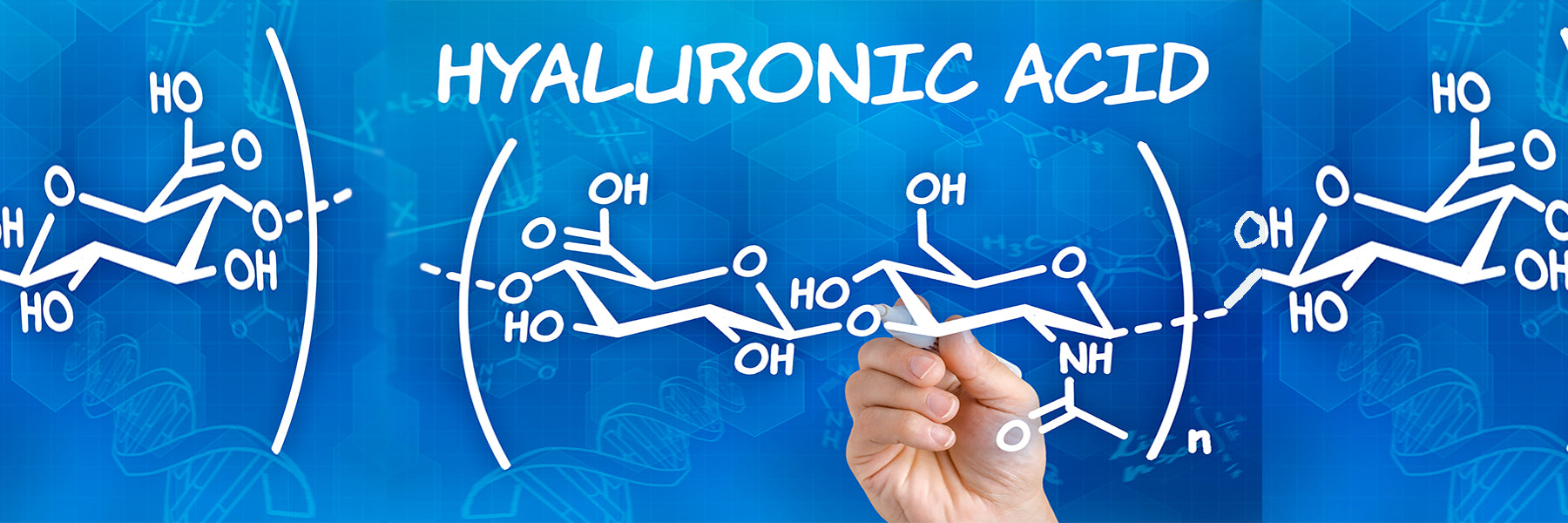
Hyaluronic Acid: Benefits and Why You Should Use It
If there's one skin care ingredient that puts our skin on the fast track to hydration, it’s hyaluronic acid.
Dermatologists and estheticians alike love this superstar skin-care ingredient... and it can give you that supple, dewy glow you're after.
Not only does hyaluronic acid do an amazing job when it comes to moisturizing the skin, but it also has an anti-aging effect because plump, hydrated skin makes fine lines and wrinkles less visible.
What many may not know, is that this essential anti-aging ingredient is already located deep within our skin. It is naturally found in the skins extracellular matrix -- where collagen is located -- hyaluronic is like a person's own fountain of youth : it is responsible for keeping skin plump, smooth and looking youthful.
WHAT IS HYALURONIC ACID
Hyaluronic acid is actually a sugar that is naturally produced in our bodies, found on our skin, in our joints, and in our eyes. It is there to help hydrate the skin and also keep joints lubricated and eyes moist.
Able to hold 1000 times its weight in moisture, 1 gram of hyaluronic acid can hold up to 6 liters of water.
And just to clarify, hyaluronic acid is not actually an acid -- it is a glycoaminoglycan (GAG) -- or a longer more complicated version of a sugar. A water binding, Jell-O like substance; it is like a saturated sponge underneath the skin, giving it a long, steady drink of water throughout the day.
Did you know?
Hyaluronic acid was initially used in medicine as a treatment to reduce swelling and pain in arthritic joints as the large molecular size of hyaluronic acid and its viscous, lubricating effect helped the body resist stressed to the joints, tissues, and skin.
MOISTURE BOOSTER AND WRINKLE ERASER
Hyaluronic acid is present in almost every tissue and organ in the body. In fact, almost half of the body's hyaluronic acid is found in tissue and helps keep skin plump, supple, and smooth.
However, with age, the body produces less hyaluronic acid, so skin loses moisture and dries out more easily. Skin then becomes thinner and takes longer to repair itself.
Collagen fibers become brittle and breakdown, causing sagging, wrinkles, and other visible signs of aging. When aging or stressed cells crave moisture, collagen fibers dry out and deteriorate, like aging rubber bands.

However, due to its hydrophilic properties, hyaluronic acid binds with water, saturating skin with moisture and locking it in and keeping collagen nourished and healthy.
Hyaluronic acid offers the perfect solution for restoring moisture to aging skin, as well as helping prevent dehydration due to seasonal changes or cold, dry environmental conditions.
DAMAGE CONTROL
The anti-inflammatory and moisturizing properties of hyaluronic acid play an essential role in cell metabolism, supporting the skin's ability to naturally heal and repair itself. Research suggests, skin aging is associated with loss of skin moisture, and hyaluronic acid is the key ingredient when it comes to combating it.
It is hyaluronic acid that also helps fight free radicals that breakdown collagen and elastin, which make wrinkles, sagging, and other signs of aging more evident. Youthful skin remains healthy due in large part to its high-water content.
Overtime, loss of moisture occurs as part of the normal process of aging, in addition to daily external environmental factors. HA is a key molecule involved in skin moisture due to its unique capacity in retaining water. It binds with large volume of water, giving solutions high viscosity, even at low concentrations.
In fact, HA is capable of penetrating the skin and binding skin cells to water, infusing all layers of the skin with moisture.
SKIN REPAIR
HA is crucial to the process of skin repair. It is usually found in high concentrations in the basel layer of the epidermis. This area maintains an open, well hydrated structure that allows the passage of nutrients, one of its main functions.
Hyaluronic acid synthesis increases during tissue injury and wound healing. It regulates several aspects of tissue repair.
FIGHTS WRINKLES
Hyaluronic acid helps to bind water to collagen, trapping in it the skin, so that skin can appear plumper, dewier, and more hydrated. That plumping effect can also help reduce the appearance of fine lines, and leaves skin looking brighter and more evenly toned.
Whether your skin is dry, oily, sensitive, or somewhere in between, when it comes to hyaluronic acid, it's really a come one, come all situation. The one caveat is that the other ingredients found in a specific hyaluronic product must also be compatible with your skin type or otherwise not cause adverse reactions. i.e. allergies or sensitivities to other ingredients.
Because hyaluronic acid is so appropriate for various skin types and conditions, it is a must-have for any skincare routine. Finally, hyaluronic acid plays well with other anti-aging ingredients, such as peptides and antioxidants.
You can now create an unparalleled well-aging power skincare routine led by the superstar benefits of hyaluronic acid.
Editorial Sources and Fact-Checking
1. Eleni Papakonstantinou, Michael Roth, and George Karakiulakis Dermatoendocrinol. 2012 Jul 1; 4(3): 253–258. Hyaluronic acid: A key molecule in skin aging
2. Acta Biomater. 2014 Apr; 10(4): 1558–1570. Hyaluronan: A Simple Polysaccharide with Diverse Biological Functions



Leave a comment